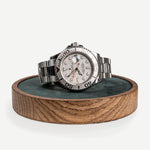





REC Watches Turbo NavyBlue
Order before
19 :
37 :
43
shipped
The TURBO NavyBlue is a Swiss-made timepiece inspired by the vibrant spirit of ‘Turbo era’ cars from the 1980s.
The Turbo Decade
The TURBO craze was a phase in the 80’s which infused everyday road cars with the magical powers of race cars. From no-nonsense family cars to world-beating supercars, ‘Turbo Everything’ was a phrase coined in the industry.
The fuel crises of the 1970’s spurred automakers to spend the development money on precision machining and overbuilt, higher-pressure-tolerant engines to make turbochargers feasible.
A striking TURBO badge embossed across the exterior of the car sold itself – in fact, many automakers sold the infamous badging, but not necessarily the associated turbocharging.
The first real successes in the market were the Mercedes-Benz 300SD and the Saab 900 Turbo in the late 1970’s. With the concept finally proven for passenger cars in the real world, automakers and buyers began to flock to smaller-displacement and fuel-efficient turbocharged cars over the coming decade.
- Diameter 40,0 mm
- Height 12,3 mm
- Lug-to-Lug 46,0 mm
- Dial Opening 31,6 mm
- Swiss-made SELLITA cal. SW200-1
- Time & Date (Hours, Minutes, Seconds & Date)
- Sweeping seconds
- Self-winding mechanism
- Date quick setting
- Automatic & manual winding
- 20 Jewels
- 41 Hours power reserve
- VPH 28,800 bph, 4Hz
- Accuracy ±5 sec per day
- Top Glass: Sapphire crystal w. 3 layers of anti-reflection coating + sapphire coating
- Caseback Glass: Mineral glass w. smoky effect
- Case, bezel, crown & caseback: 316L Stainless steel.
- Free Worldwide Shipping
- Free Returns & Exchanges

Inspiration
A boxy design for an ‘out-of-the-box’ car
Prior to the 1980’s, automakers mainly developed new car designs using clay, wood, or other physical materials, but during the 80’s they started to use computer models. Using computers allowed aerodynamic calculations which supported needed fuel efficiency, it also gave automakers the means to produce softer curves – that was developed further in the following decades.
The 80’s represented a change in style that had not been seen before in automotive engineering. Not only did cars get new exterior designs with sporty details such as hood scoops and rear window plastic louvres – both in factory-standard models and custom modifications.
The cabins became more technology-focused with cool comfort features, like digital instruments, trip computers, climate control, air conditioning and basic seat functions. Cheaper materials as textile replaced leather and plastic was the new to go material replacing not only wood trim but used as constructional components inside the interior.

Result
The core of TURBO
From choices in materials, styling and shape, the TURBO Collection is designed to mimic this retro-cool era of car design.
A sentiment for those who want to reminisce, the turbo-inspired design cues imbuing throughout the watch range harken back to the shape, materials, and styling of these highly characteristic cars. Enclosed within a 40mm case that showcases the same rigidity and boxy silhouette of the turbocharged cars, the timepieces are scattered with evocative design references left for the wearer to cherish.
The dial draws inspiration from the rear window louvres, made from recycled plastic and engraved with the iconic ‘Turbo badging’ at 4 o’clock. Below the upper dial, sits a full Super-LumiNova lower dial, allowing a radiant presentation of neon glow through both the indices and louvre-slats.
This is neatly complemented by the vibrant (HNBR) rubber straps to match the decade of illuminated colour, complete with 1980’s decal styling and quick-release system.




